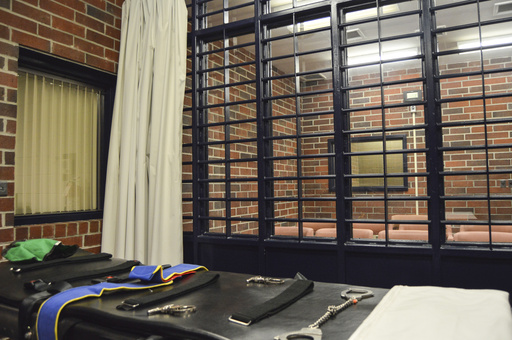
COLUMBIA, S.C. — Richard Moore, a death row inmate in South Carolina, has garnered significant support in his clemency petition, which was submitted on Wednesday, just days before his scheduled execution via lethal injection for the 1999 murder of a convenience store clerk, James Mahoney. More than 20 individuals, including two jurors and the presiding judge from his trial, have signed the petition requesting that Governor Henry McMaster reconsider Moore’s death sentence.
Among those advocating for Moore’s clemency is a former director of the state’s prison system. He argues that Moore has shown genuine remorse for his actions and has been a positive influence on both his fellow inmates and his family. The supporters also include six childhood friends, five family members, previous attorneys who have remained in contact with Moore, and the partner of a psychologist who developed a meaningful friendship with him during evaluations.
In his heartfelt correspondence to Governor McMaster, Ravi Walsh expressed his belief in Moore’s desire to contribute positively to the world rather than seeking an end to his life in prison. “I have often wondered why Richard would rather spend his life in a prison cell than end this hell he must encounter every day. When I asked him, he told me that he finds that he now has something to offer the world,” he wrote in a collection of letters totaling 42 pages.
Historically, governors in South Carolina have not granted clemency to any of the 44 inmates executed in the state since the death penalty was reinstated by the U.S. Supreme Court in 1976, making South Carolina uniquely persistent in enforcing capital punishment without reprieve. Governor McMaster has committed to a careful examination of Moore’s clemency appeal, indicating he will announce his decision just moments prior to the execution scheduled for Friday at 6 p.m. EDT.
Moore’s legal team emphasizes that clemency should be viewed as an expression of grace and mercy, focusing on his conduct since he fatally shot Mahoney during a confrontation over a 12-cent shortage in payment. Now 59, Moore has reflected deeply on his past; he has become a born-again Christian and has taken on the role of mentor to other inmates on death row. Former corrections director Jon Ozmint contends that if Moore’s sentence were commuted to life without parole, he could extend his positive influence to a broader range of inmates.
Ozmint remarked that “his story and manner of living would allow him to be an influential force for good” among the prison population, particularly with young offenders. Notably, he expressed his support for the death penalty but emphasized that it should not be applied arbitrarily.
In the clemency petition, Moore openly accepted responsibility for his crime, stating, “This is definitely part of my life I wish I could change. I took a life. I took someone’s life. I broke the family of the deceased. I pray for the forgiveness of that particular family.” However, the legal arguments surrounding his case also include claims that his defense team failed to provide adequate representation during his 2001 trial, as key evidence and an alternative narrative were not presented.
Moore’s current legal representatives highlighted that he was unarmed at the time of the initial incident and did not intend to kill anyone. As the case unfolds, concerns have been raised regarding the jury’s composition; lawyers for Moore, who is Black, have appealed to the U.S. Supreme Court to pause the execution, questioning the fairness of a jury devoid of African Americans in a county with a significant Black population.
Throughout his time in prison, Moore has maintained relationships with his children, now also involving his grandchildren through video calls. His family has expressed their distress at the potential loss of his presence in their lives. His son, Lyndall, noted, “He does not make excuses for his actions — his only interest is staying alive so he can serve as an example.”
As the imminent execution date approaches, Ozmint reflected on the gravity of the situation, stating during a video for Moore’s petition, “I know I’ll see Richard on the other side. I just don’t know when that will be. I hope that Gov. McMaster will give Richard the rest of his life to pour into the lives of others.”
